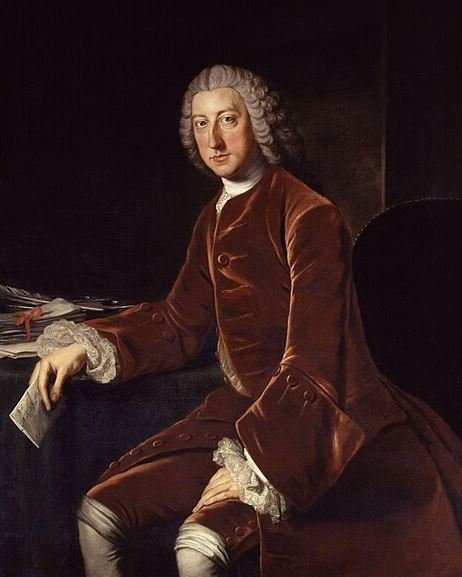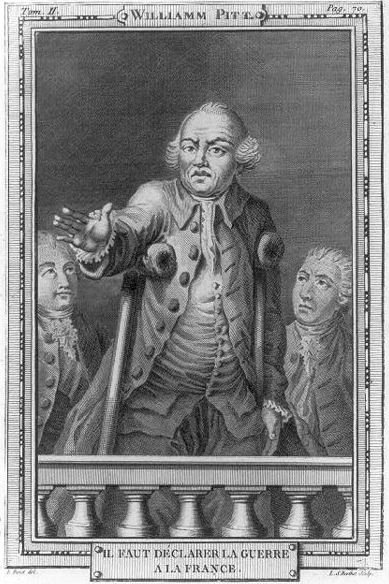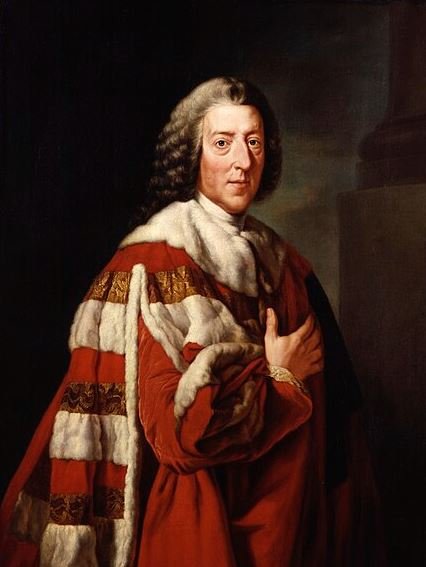Life and Major Accomplishments of William Pitt the Elder

William Pitt the Elder is notable for his powerful oratory, leadership during the Seven Years’ War, and his advocacy for British imperial power and fair governance. Image: A portrait of Pitt the Elder in his study by British artist William Hoare.
William Pitt, 1st Earl of Chatham (1708–1778), commonly known as Pitt the Elder, was a towering figure in 18th-century British politics. A member of the Whig party, he is celebrated for his powerful oratory, political acumen, and significant contributions to expanding British influence during the height of its imperial ambitions.
Pitt the Elder’s career, marked by both dramatic successes and periods of opposition, left a profound impact on Britain’s development as a global power and laid the groundwork for future leaders, including his son, William Pitt the Younger.
Early Life and Background
William Pitt was born on November 15, 1708, into a prominent family. He was the grandson of Thomas Pitt, Governor of Madras, whose wealth from Indian trade bolstered the family’s fortune and status. Pitt’s father, Robert Pitt, was a Member of Parliament, ensuring that young William grew up surrounded by political discourse and connections. This privileged upbringing prepared him for a future in public life, where he would become one of Britain’s most influential statesmen.
Pitt received his education at Eton College, an institution renowned for producing future political and military leaders. His time at Eton instilled in him the classical education and rhetorical skills that would later become hallmarks of his career. Pitt then attended Trinity College, Oxford, though health issues limited his time there. Nonetheless, his education contributed to the deep well of knowledge that he frequently drew upon in his oratorical performances.
Entry into Politics
Pitt entered politics in 1735 when he was elected as the Member of Parliament (MP) for Old Sarum, a constituency effectively controlled by his family. From the outset, he was noted for his fiery speeches and willingness to challenge established figures. His talent for oratory and his commitment to the principles of integrity and national interest quickly set him apart.
During the early stages of his career, Pitt emerged as a vocal critic of Sir Robert Walpole, the long-serving and powerful Prime Minister whose administration was often accused of corruption. Pitt’s attacks on Walpole resonated with those who were weary of the Prime Minister’s perceived complacency and nepotism. This earned him the reputation of being a reformer and a champion of the common good, a role that would define much of his political life.
“The Great Commoner”
Pitt’s refusal to accept a title for much of his career earned him the nickname “the Great Commoner.” This moniker symbolized his connection to the ordinary British citizen and distinguished him from the aristocracy-dominated political sphere. He championed policies that prioritized national interest and expansion, aligning himself with those who believed in the potential of the British Empire.
Political Rise and the Seven Years’ War
Pitt’s first major political role came in 1746 when he was appointed as Paymaster General. While the position was traditionally a lucrative one, with officials often enriching themselves through commissions, he refused to exploit his office for personal gain. This commitment to integrity further bolstered his reputation as a principled leader.
His most influential period came when he assumed informal leadership of the British government during the Seven Years’ War (1756–1763). Officially serving as Secretary of State for the Southern Department from 1756 to 1761, Pitt was effectively the driving force behind Britain’s war strategy. The war itself was a global conflict involving many of the major European powers, as well as their respective colonial empires.
Pitt’s leadership during the war was marked by bold and strategic decisions that significantly contributed to Britain’s success. He focused on expanding British military efforts in North America and India, areas he saw as crucial to future imperial strength. Under his guidance, Britain secured key victories, including the capture of Quebec in 1759, a pivotal moment that led to British dominance in Canada. In India, Pitt’s policies and support for military leaders like Robert Clive helped lay the foundation for British supremacy on the subcontinent.
Pitt’s vision extended beyond mere military conquest. He understood the importance of a strong navy and invested heavily in Britain’s naval capabilities. This move not only allowed Britain to secure its maritime trade routes but also solidified its status as a dominant naval power for generations.

William Pitt’s speech, “We must declare war on France”, to Parliament illustrates his firm stance against France, urging war over colonial issues.
Brilliant Oratory and Influence
Pitt’s oratory was one of his most formidable assets. His speeches in the House of Commons were characterized by eloquence, emotional appeal, and intellectual depth. He had an exceptional ability to draw on historical and literary references, which added weight to his arguments and captured the imagination of his audience.
Historians like P. D. G. Thomas have argued that Pitt’s power did not stem from aristocratic connections or wealth but from his unparalleled command of rhetoric and strategic thinking.
His ability to sway opinions in Parliament and among the public was crucial in rallying support for his policies, particularly during the war. Pitt’s speeches often invoked themes of national pride, calling on Britons to support the war effort as a means of securing their country’s greatness and future prosperity.
Challenges and Opposition
Despite his successes, Pitt’s political journey was not without challenges. His strong personality and uncompromising nature sometimes put him at odds with other influential figures, including King George II and, later, King George III.
Pitt’s relationship with King George II was especially strained because the monarch favored a more cautious and traditional approach to governance, whereas Pitt was known for his aggressive and expansionist policies.
In 1761, disagreements over the conduct of the war and peace negotiations led to Pitt’s resignation from his position as Secretary of State. He opposed making peace with France on terms he deemed too lenient and was unwilling to compromise on his vision of British supremacy. This departure marked a temporary setback in his career, although he remained an influential voice in opposition.
Return to Power and the Prime Ministership
In 1766, Pitt returned to a position of power, this time as Prime Minister. He accepted the title of Earl of Chatham, which marked his entry into the House of Lords and effectively ended his status as “the Great Commoner.” Although his influence remained significant, this period was less successful than his earlier years.
Pitt the Elder’s tenure as Prime Minister (1766–1768) was hampered by several factors, including his declining health. He suffered from severe bouts of illness that limited his ability to effectively lead and manage his cabinet. Additionally, his administration was marked by internal divisions and a lack of cohesion among its members. The fragmented nature of his ministry made it difficult to push forward a consistent policy agenda.
One of the key issues during Pitt’s premiership was his approach to the American colonies. While he had supported the repeal of the Stamp Act in 1766, which had been highly unpopular in the colonies, his government struggled to formulate a sustainable policy that balanced the interests of Britain and the growing discontent in America. Pitt’s health and reduced capacity limited his ability to exert the same control and vision he had displayed during the Seven Years’ War.
Advocacy for American Grievances
Despite his weakened state, Pitt remained a vocal advocate for addressing the grievances of the American colonies. He believed that the colonies should be treated with respect and fairness and warned that heavy-handed policies would only lead to division and conflict.
In his speeches, he expressed sympathy for the colonial position, emphasizing that they deserved the same rights as British citizens at home. This perspective highlighted his broader view of governance, which balanced imperial ambition with an understanding of the principles of justice and representation.
Although Pitt’s efforts could not prevent the eventual outbreak of the American Revolutionary War, his warnings and calls for moderation are often cited as prescient. His stance demonstrated a nuanced understanding of the complexities of managing an empire and the importance of maintaining loyalty through fair treatment.
Legacy and Assessment
His legacy is complex and multifaceted. He is remembered as a visionary leader who played a central role in shaping Britain’s global position during a critical period. His wartime leadership during the Seven Years’ War was crucial in securing Britain’s victory and expanding its empire. The territorial gains made under his direction set the stage for British dominance in the 18th and 19th centuries.
Pitt’s emphasis on naval power laid the foundation for Britain’s status as the world’s leading maritime power, a position it would maintain for over a century. His ability to inspire and mobilize public and parliamentary support through his oratory set a standard for political leadership that influenced subsequent generations of statesmen.
However, Pitt’s career was not without its shortcomings. His uncompromising nature and focus on personal principles sometimes led to conflicts and alienation within the political sphere. His tenure as Prime Minister was marred by ill health and internal divisions, which limited his effectiveness during that period. Nonetheless, his advocacy for fair treatment of the American colonies and his opposition to government corruption reinforced his image as a leader committed to ethical governance.
His influence extended beyond his own lifetime through the political career of his son, William Pitt the Younger, who would go on to become one of Britain’s most notable Prime Ministers. The younger Pitt’s approach to leadership, with a focus on integrity, reform, and strengthening the nation, echoed the principles espoused by his father.
Historians’ Perspectives
Historians have ranked Pitt the Elder among the greatest British prime ministers, recognizing his contributions to British political and military history. His leadership during wartime and his strategic vision for empire are often highlighted as defining aspects of his statesmanship. Marie Peters, among others, has argued that Pitt’s consistent advocacy for Britain’s imperial expansion was grounded in a coherent vision of the country’s role on the world stage. This approach, while expansionist, also considered the moral and ethical dimensions of governance.
- D. G. Thomas and other scholars have noted that Pitt’s oratory was not just a tool for persuasion but an essential element of his power. His speeches, filled with literary and historical references, captivated audiences and solidified his status as a leader who could command respect through sheer intellectual force. This ability to articulate complex ideas and inspire confidence remains a key reason why Pitt is celebrated in the annals of British political history.
Conclusion
Pitt the Elder’s legacy as “the Great Commoner” underscored his deep connection to the people and his belief in serving the nation’s interests above personal or aristocratic gains. His vision of British greatness, balanced with a nuanced understanding of the responsibilities that came with power, set a standard for future leaders.
Frequently Asked Questions about William Pitt the Elder

Why was Pitt called “the Great Commoner”?
His was known as “the Great Commoner” because he refused to accept a noble title until 1766, symbolizing his dedication to public service and connection with the common people over aristocratic privilege.
What stance did Pitt take early in his political career?
Early in his career, Pitt was a fierce critic of the government, particularly attacking Sir Robert Walpole’s administration in the 1730s for corruption and opposing policies like the Hanoverian subsidies in the 1740s. He was known for his independent, principled stance and willingness to challenge established powers.
What was Pitt’s role during the Seven Years’ War?
He was the informal leader of the British cabinet from 1756 to 1761, directing Britain’s military strategy. His leadership was crucial in securing victories both in Europe and overseas, notably in the American colonies during the French and Indian War, which solidified Britain’s global dominance.
How did Pitt’s oratory skills contribute to his political influence?
His exceptional oratory skills allowed him to command attention in the House of Commons. His speeches, known for their historical knowledge and literary references, enabled him to sway public and parliamentary opinion, making him a dominant figure based on his rhetorical prowess rather than wealth or family connections.
What challenges did Pitt face despite his successes?
Despite his successes, he often found himself out of formal power and opposed governmental policies he viewed as corrupt or damaging to Britain. In the 1760s, he criticized peace terms with France and later, in the 1770s, opposed British policies toward the American colonies, advocating for fairness and unity.
What position did Pitt accept in 1766, and how did it change his public image?
In 1766, he accepted the title of Earl of Chatham and became Lord Privy Seal, marking his entry into the peerage and ending his reputation as “the Great Commoner.” This move shifted him from the House of Commons to the House of Lords but did not diminish his political influence.
How effective was Pitt’s term as Prime Minister (1766–1768)?
Pitt’s term as Prime Minister was less impactful than his previous roles due to declining health and difficulties in managing a fragmented ministry. His influence waned during this time, although his vision for British expansionism and power continued to shape policy.

Image: A painting of Pitt the Elder by English artist Richard Brompton.
What legacy did Pitt leave behind?
Pitt’s legacy includes his wartime leadership, strong opposition to corruption, and dedication to the expansion and strength of the British Empire. He is remembered for balancing imperial ambitions with fair governance and is ranked highly among British prime ministers for his strategic insight and eloquence.
How did Pitt view Britain’s relationship with the American colonies?
He supported the American colonies’ grievances and advocated for fair treatment to maintain unity and prevent conflict. His stance, although not enough to prevent the Revolutionary War, showcased his belief in fair governance and the rights of British subjects throughout the empire.
What have historians said about Pitt’s statesmanship?
Historians, including Marie Peters, argue that Pitt’s statesmanship was marked by a consistent and clear appreciation of the British Empire’s value and global role. His strategic vision and dedication to Britain’s prosperity place him among the greatest British political leaders.



























